'Jessica Jones': Inside Episode 8 With Creator Melissa Rosenberg and Writer Scott Reynolds
,
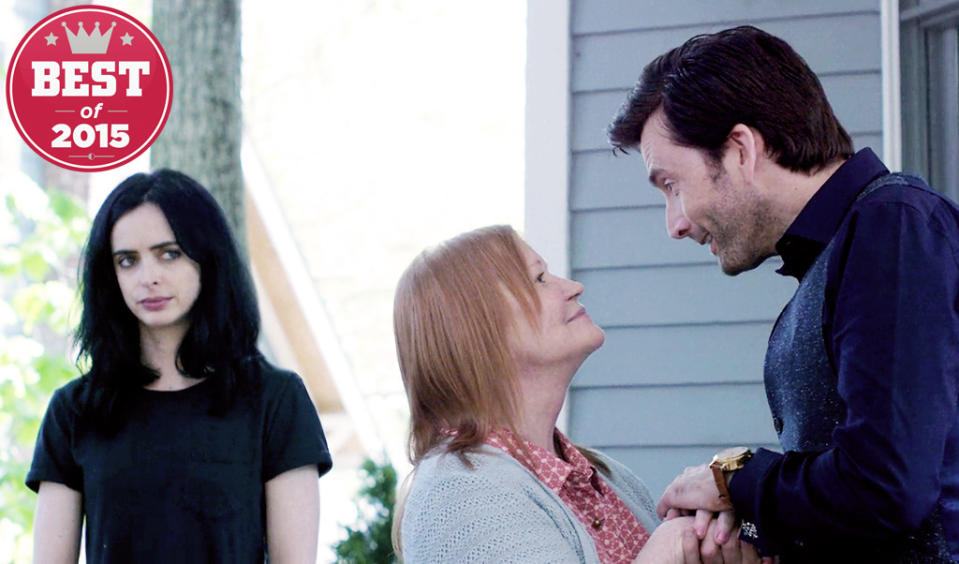
Warning: This piece contains spoilers for the “AKA WWJD?” episode of Marvel’s Jessica Jones.
For many of those who’ve already binge-watched Marvel’s Jessica Jones on Netflix, episode 8 — which made Yahoo TV’s list of the Best TV Episodes of 2015 — is a favorite. After finally coming face-to-face again with Kilgrave (David Tennant), the man who controlled her mind and body for months, in the police station near the end of the previous hour, private eye Jessica (Krysten Ritter) agrees to move in with him so she can try to secretly record him confessing that he compelled a young woman to kill her own parents. Kilgrave, who now wants Jessica to choose to be with him of her own free will, has bought her childhood home and painstakingly decorated it to look as it had before her parents and brother were killed in the car accident that gave Jessica her super-strength.
Show creator Melissa Rosenberg always knew where she wanted to begin and end the 13-episode season, and when the writers’ room started placing the stepping stones to get there, the moment when Jessica and Kilgrave would heatedly dissect their history stayed in place on the board for most of the story breaking. Writer Scott Rosenberg was assigned episode 108, no matter what.
“Once we had broken it all out and I realized, ‘Wow, I’m writing the episode where the two characters are sitting in a house,’ I was both scared and super excited,” he says with a laugh. As Rosenberg explains, “It is so exciting as a writer to have your work performed by actors of that caliber. [But] this could be a very dicey prospect — basically, it is a stage play. That was also what really excited us; it was a really different turn for the show. It was really about this two-person character exchange, and it was one of my favorites as well in terms of just the pure drama of it.”
Related: The Best TV Dramas Of 2015
Yahoo TV spoke with Rosenberg and Reynolds separately to piece together how they pulled it off, including the surprise answer to the question, What Would Jessica Do?
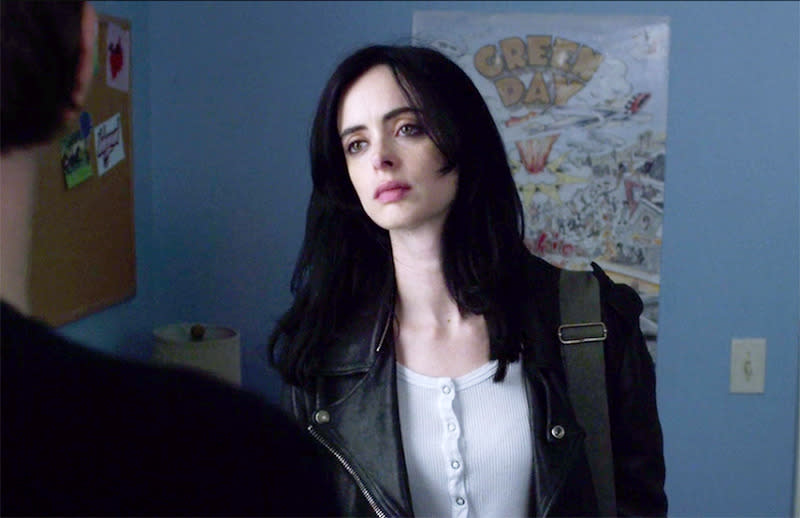
Kilgrave recreating Jessica’s childhood home isn’t in Brian Michael Bendis’s Alias comic. Where did the idea come from?
Melissa Rosenberg: One of our young writers, Jenna Reback, had done some research and discovered that one of the ways to deal with Post-Traumatic Stress Disorder is to remember the street names of your childhood. There are many different methods, but she noted that one, and we glommed on to it. That evolved from there.
Scott Reynolds: We were talking about it in the room, all thinking, what would be the best gift that Kilgrave could ever get her? Especially like a jilted Kilgrave, who doesn’t really quite understand the ways of the world and who could also have anything that he wants in the whole wide world. And so this thought of “you can’t go home again” sort of popped up, and how Jessica’s best moments were her times with her mom and her dad and her little brother. It’s sort of like remembering back through rose-colored stained-glass windows. So here’s a guy that could give the best gift in the whole wide world thinking, I can give her all the things that she felt the happiest in. It all came out of this really twisted and messed-up romantic notion that Kilgrave had.
Watching this episode, you’re thinking, Oh, this is why they wanted David Tennant. In addition to bringing out all the layers Kilgrave shows (the charm, the hurt, the anger), Tennant’s just so innately likable that you’re waiting for Kilgrave to give you the tiniest reason to not hate him. Was that part of your goal in this episode, to make us empathize with Kilgrave, if only for a moment, so you could then rip the rug out from under us?
Reynolds: Yeah, absolutely. The first three, four episodes, he is this dark, looming specter, this monster we just kept building and building all the way up to episode 7, when he walked into the police station and tells all the cops to hold the gun to their head so he could tell Jessica that he loved her. Even that monster, there’s like a slight bit of sweetness to it, but in a total stalker-y way. The goal was, in fact, to make us see the world through Kilgrave’s eyes. Every character in the show — I mean every single one of them — has been hit by some form of trauma. We show how they react to it. That moment [in episode 8] when Kilgrave, at first like a child, says, “Do you know how hard it is? I once told a man to go screw himself” — it’s supposed to be sort of funny, but it helped us understand how hard it would be to live inside his body, to a certain extent. Then, of course, being the kicker, how can you not feel for young Kevin when his parents are sticking the needle in the back of his head?
Really, the hope was that not only would the viewer suddenly look at Kilgrave with a whole different viewpoint, but that we could also bring them along to the thought that Jessica Jones might be the one to save him, too. Because Jessica isn’t necessarily about revenge in this whole series — she’s about making things right, she’s about proving that Hope Shlottmann didn’t kill her parents. If she ever could do that, then maybe she could save herself. That’s different than most revenge movies.
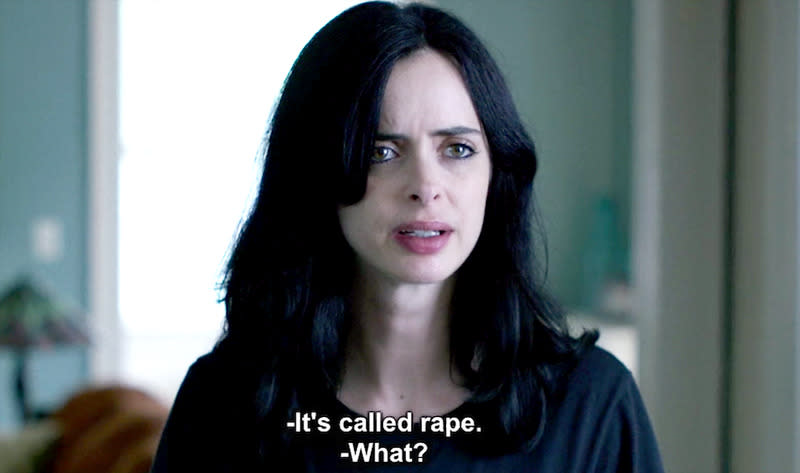
Let’s talk about specific moments. When Jessica tells Kilgrave that he raped her repeatedly, he seems genuinely surprised to hear her use that word. In his mind, he truly doesn’t see it as rape?
Rosenberg: He doesn’t see it that way, and never has. The man is a sociopath. Sociopaths create their own reality and decide it’s truth. That’s one of the scariest things about sociopaths and rapists and such — they, on some level, believe that this is what their victim wanted. As writers, it was one of our favorite moments, really getting into his psychosis and seeing how he sees the world: “I’m just giving people what they want,” really not understanding that what they want and what he wants differs.
Reynolds: When Jessica actually says, “You raped me” it’s something that hasn’t been said up until this point, and all of this comes flooding out of her in such a meaningful way. Tennant equally understood Kilgrave’s point of view: He hates that word. He doesn’t even understand it as a thing, because it’s like everything that he tells people to do they just do it and they seem happy. Towards the end of the series, when he tells Trish, “Kiss me, mean it,” she’s passionate.
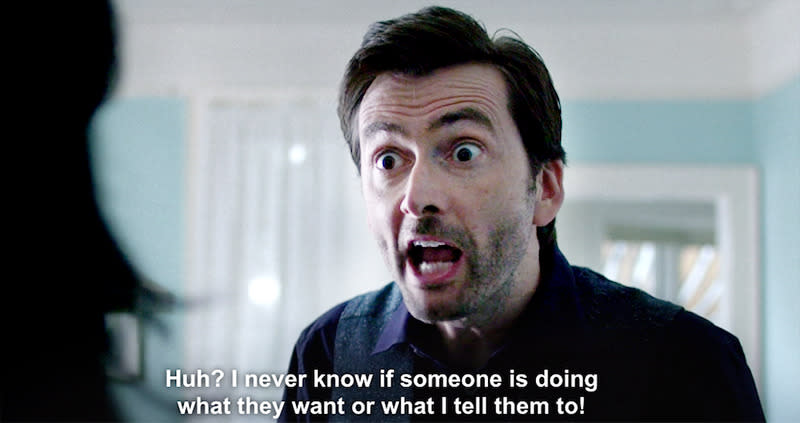
It was just as important for Tennant to redeem Kilgrave in front of everybody’s eyes. In some ways, you have to, in order to think that he could grant you hostages and do all this sort of stuff he does later. And [David] is so charming in person. He’s a good guy. There was a day on set where some crew had left their trays at lunch, and as soon as he passed them, he picked up their stuff and put it away. I was like, “I have never seen that before from No. 2 on the call sheet.” That’s just him.
It was very important for Mel, and for all of us, that there’s no ifs, ands, or buts about it: Kilgrave raped Jessica, not just physically, but every part of her being. That’s why it was also important that he’s so likable in this moment — because a lot of times, the predator is that way. It’s an important discussion for society today.
Rosenberg: These conversations are happening about women in power, and feminism, and sexual assault, and PTSD. Really just amazing, smart, insightful think pieces are being written, and it’s like, if I could have wished for anything, it would be to contribute in a positive way to those conversations. That has been a career goal, and to see it coming to pass is humbling and just incredibly wonderful.
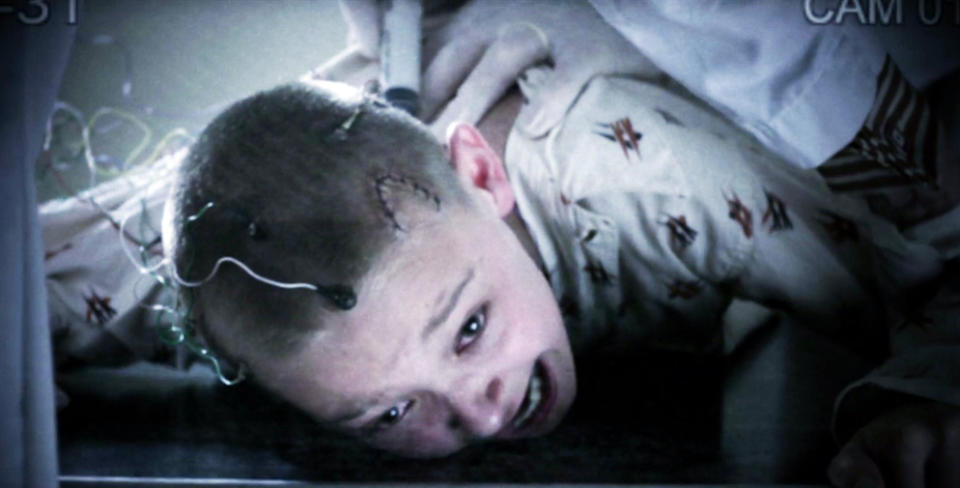
It’s not until episode 9 that we learn that Kilgrave’s parents had been trying to save him from an illness when his mind-control ability manifested as a side effect to their experimental cure, and how he abused his newfound power until they abandoned him. Did David know the full story when he filmed this?
Reynolds: We created that whole backstory [for the series]. I don’t think he’d seen the next script at that point. It was important that Kilgrave believed it 100 percent, that he was a victim back then. He’s not lying, he’s not trying to manipulate Jessica. It’s that we all have these things that we believe are true from our childhood that blow our mind when our parents tell us the whole story, and we go, “Oh, really? That’s what was going on?” Even Mrs. De Luca has that same sort of thing with her perception of young Phillip and Jessica.
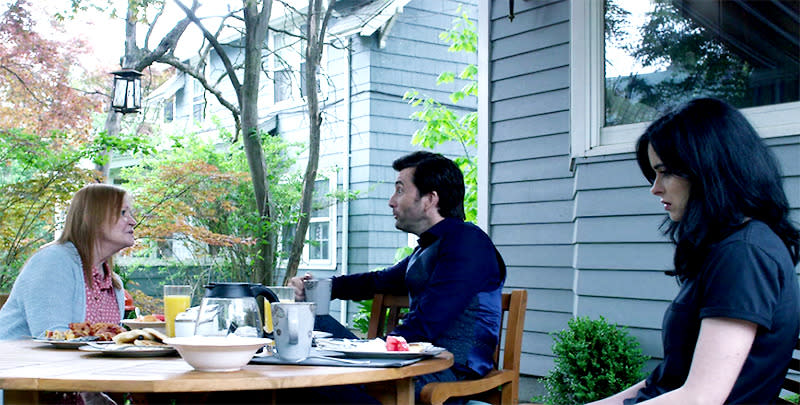
That outdoor breakfast scene with Mrs. De Luca is another fun one that takes a dark, revealing turn when she claims she knew something bad was going to happen to the Jones family.
Rosenberg: I think the episode so wonderfully dabbles with wish fulfillment. When Kilgrave says to the neighbor, “Tell the truth. Why are you really doing this?” — we all know those people who just feed off other people’s drama, and you just want to slap them. You just want to be like, “Be honest. What really was going on?” I think Scott did just such a great job of that.
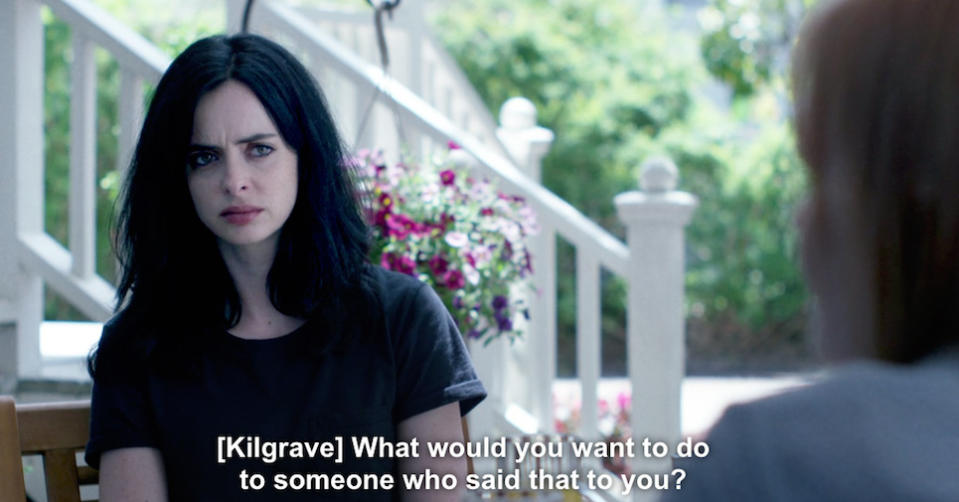
Reynolds: We all have people in our lives that are like, “I was almost on that airplane when it crashed.” Then it was that kind of neighbor that just interferes with your life. It was important for me that we see Kilgrave’s powers as a good thing in that moment, that we want Kilgrave to make Mrs. De Luca pay for what she’s been saying all along, just to make Jessica be a part of his powers. There’s a moment when Kilgrave asks Mrs. De Luca, “What would you like to do to a person who did that to you?” She says, “Slap her.” He takes that slight look at Jessica, and then Ritter has this look in her eye like, damn, she really wants to [let Kilgrave tell Mrs. De Luca to do it], but she’s not going to. In some ways, you sort of want her to. Almost. It’s that seductiveness of these powers. That was super important. And that actress that played Mrs. De Luca [Kathleen Doyle] was great.
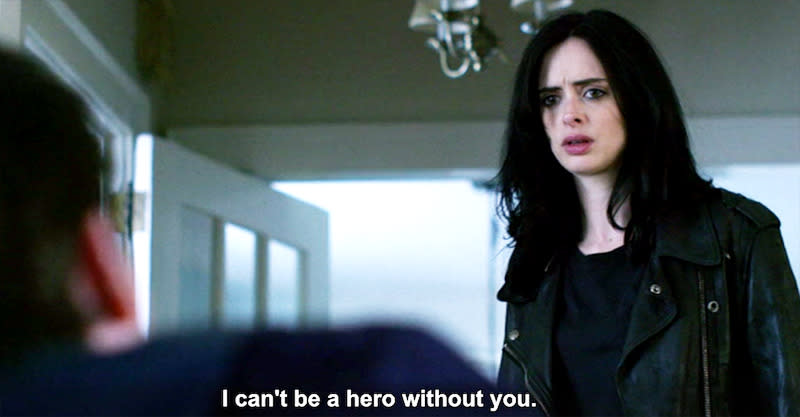
Another key moment is Jessica taking Kilgrave to a hostage situation to show him how to use his powers for good. Afterward, when Kilgrave suggests she stay with him so he can learn to be a superhero and continue “evening the scales,” there’s a part of you, as a TV viewer who’s enjoying these scenes, that wants her to — even though you feel horrible about it. What do you say to those viewers?
Rosenberg: We loved the dilemma of it, and had her take it seriously. It’s like, if she’s really serious about helping people, this is a way she could do it. It would be at the cost of her soul, and at the cost of her freedom, but is it worth it? There were speeches in there, too, that we ended up cutting out, but when she’s talking to Trish about, “You could walk into the Middle East and solve the problem. Just tell them, 'Get along.’ You could walk into a courtroom and demand that any accused person tell the absolute truth.” There’s so much that you could do to save the world if you harnessed that kind of power, and she’s well aware of it, but she’s also well aware that she’s not the person to do that, that ultimately his power is corrupt. It’s corrupted him.
Reynolds: There was talk about, “Is there another episode where it is, as Kilgrave calls them, a dynamic duo? Is there an episode where they are saving the world?” I don’t think we really went that far down the road. We thought, what could you do beyond that [hostage] situation? Stopping bank robberies? It’s all that stuff that we’ve seen before. It goes to the strength of Ritter and Tennant that we wanted that. My wife was like, “Hon, I wish she would have done it, kind of.” It’s with her rapist. It’s amazing.
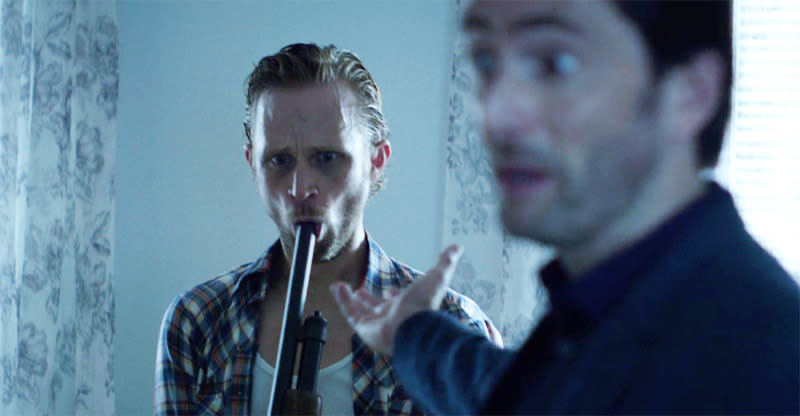
That [hostage] incident was another very important moment for Jessica to understand that Kilgrave really just doesn’t even understand what’s good and what’s bad and what’s right and what’s wrong. That actor who played Chuck [Ryan Jonze] had that barrel up in his mouth. He’s crying and gagging on set, and he was doing it so well that at one point, Ritter just sort of stopped everything and was like, “Are you okay?” She thought he hurt himself. He was fully committed, which he needed to be. He’s like, “No, no, I’m good.” It was a funny moment in the dailies.
The hope was that we, as the viewers, are watching the scene and go, "Oh, this is going to be sort of fun.” It’s twisted and messed up, but we all have relationships with our oppressors, to a certain extent, people that did terrible things to us. It was ultimately more about Jessica’s character and where she’s at in her journey at that point. It all comes down to Jessica’s worldview of herself, that she’s not good enough. By the end of the series, we move her a little bit further towards thinking that she’s good enough, but at that moment, she compared herself to Trish. That’s why she does what she does. That’s why there’s that twist at the end.
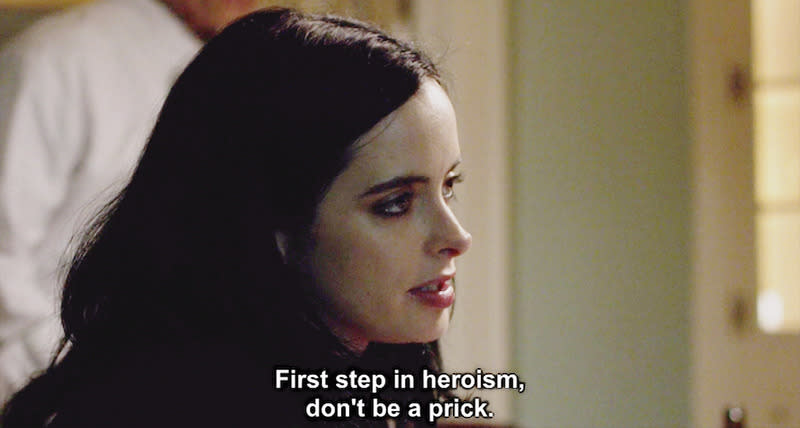
When did you know you had gotten the script to the point where people would think Jessica was going to stay with Kilgrave and be totally surprised when she drugs him at dinner?
Reynolds: That’s the thing, you never know; you hope. We hoped when Netflix read it and they liked it. They called it a twist. We were like, “Oh, I think we might have it.” We want it to be a big switch. Just even the fact that Jessica comes in with Chinese food, and the way she just drops “Don’t be a prick” when she says that’s the first part of being a hero. She’s not acting like she’s trying to be kind. She’s acting like Jessica, which is what helps makes it so believable. Krysten handled it beautifully.
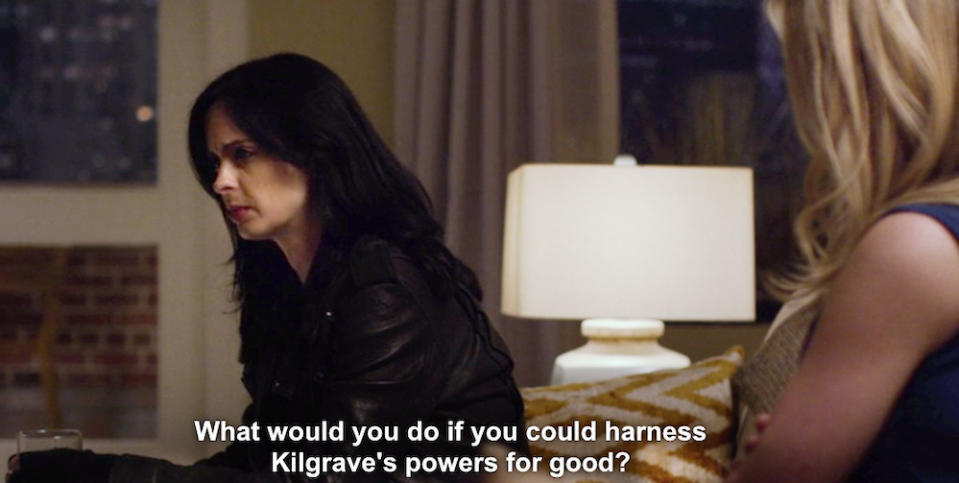
Rosenberg: We were very careful not to flag that it was coming, which is why that scene with Trish is so important. Jessica is genuinely debating it, and you go out of that going, “She’s really torn.” And then you go back, and she’s serving Chinese food. You’re saying, “She’s going for it.” And then you have this great moment where she is Jessica Jones, she is who she is. That’s one of the things I so love about her character — she is unapologetically who she is. This episode so completely defines her in that way. In an episode in which Kilgrave is trying to make her into something that she’s not, the final beat of the episode is, “Uh-huh, motherf–ker. Sorry, didn’t work.” That’s one of the things I love about Scott’s title, “What Would Jessica Do?” I love that thematic throughline of the episode.
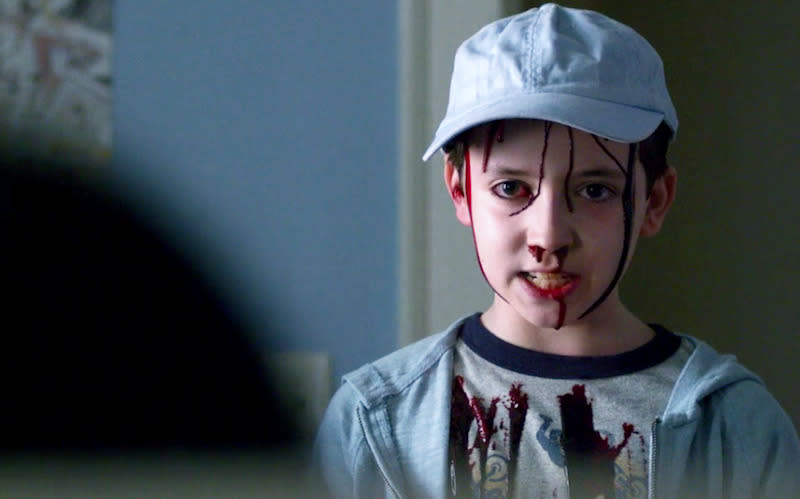
Lastly, I wanted to discuss the dream sequence with Jessica seeing her family bloodied. Was that scripted to be as terrifying as it turned out?
Reynolds: Yeah. In some ways, we talked about this being a two-hander, being like a play, but there’s two moments in it that were real important that director Simon Jones and the whole team nailed really well of just horror. Like that moment when Jessica is walking down the hall after she sets her trap to find out what things Kilgrave has in place to protect himself. The door creeps open just a little bit, which is supposed to be like a ghost story, which is what she’s living with basically inside this house, these ghosts that are within her. That was supposed to be a true horror movie moment.
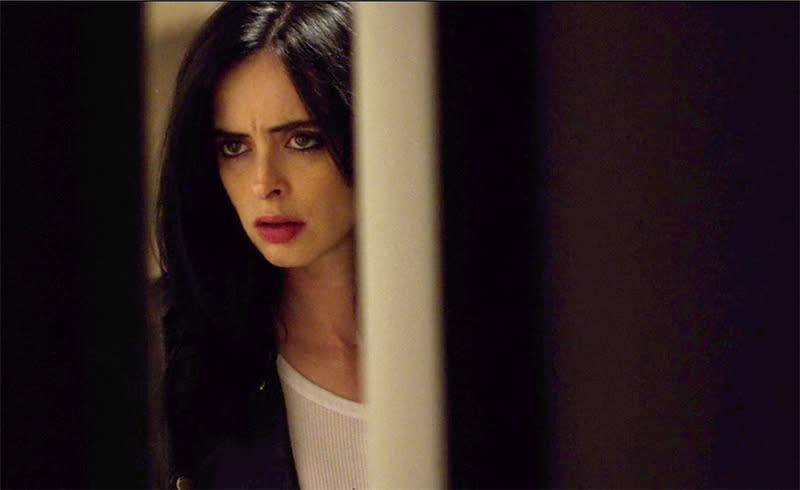
Then this dream, the effects crew just really nailed it. It was supposed to be just terrifying, and then also open up a door for us to understand not only Jessica’s motivations, but where she comes from and how she holds herself responsible, and how all through this series, Jessica is walking up to people who have had these horrible Kilgrave experiences and saying to them, “It’s not your fault. It’s not your fault. Repeat it back to me.” She does this to almost everybody, even Simpson. Yet it’s the very thing that she can’t say for herself. She feels like it’s all her fault, which then sets up why she thinks maybe it would be a good thing if she were to go off with Kilgrave to be a hero. It’s all very interconnected.
But I tell you, even just having a little kid swear — “make it godd–n right" — is scary. We were worried that we might not be able to get it through. But Marvel, Netflix, everybody was all good about it.
Marvel’s Jessica Jones is streaming on Netflix.


